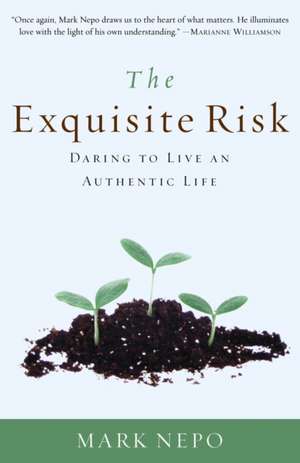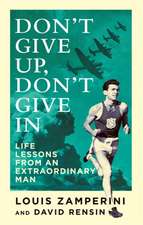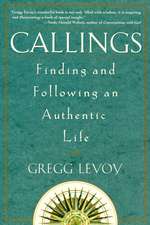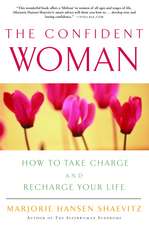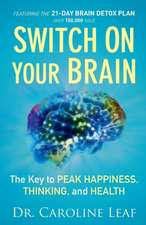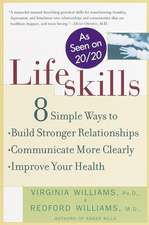The Exquisite Risk: Daring to Live an Authentic Life
Autor Mark Nepoen Limba Engleză Paperback – 31 ian 2006
In the spirit of works by Deepak Chopra and Ram Dass, The Exquisite Risk unfolds in chapters like “The Struggle to Be Real,” “There Are Teachers Everywhere,” “The Rhythm of Kindness,” and “The Gift of Surprise,” offering fresh perspective on the art of being alive and providing essential insight into how we can minimize what stands between us and our experience of life.
From the Hardcover edition.
Preț: 105.64 lei
Nou
Puncte Express: 158
Preț estimativ în valută:
20.22€ • 21.02$ • 16.77£
20.22€ • 21.02$ • 16.77£
Carte disponibilă
Livrare economică 18 ianuarie-01 februarie 25
Preluare comenzi: 021 569.72.76
Specificații
ISBN-13: 9780307335845
ISBN-10: 0307335844
Pagini: 290
Dimensiuni: 132 x 203 x 20 mm
Greutate: 0.25 kg
Editura: Three Rivers Press (CA)
ISBN-10: 0307335844
Pagini: 290
Dimensiuni: 132 x 203 x 20 mm
Greutate: 0.25 kg
Editura: Three Rivers Press (CA)
Notă biografică
Mark Nepo is a poet and philosopher who has taught in the fields of poetry and spirituality for forty years. A New York Times #1 bestselling author, he has published fourteen books and recorded eight audio projects. Recent work includes Reduced to Joy (2013), Seven Thousand Ways to Listen (2012), and As Far As the Heart Can See (2011). Mark has appeared with Oprah Winfrey on her Super Soul Sunday program on OWN TV, and has also been interviewed by Robin Roberts on Good Morning America. His work has been translated into more than twenty languages. Please visit Mark at: www.MarkNepo.com and http://threeintentions.com.
From the Hardcover edition.
From the Hardcover edition.
Extras
OPENING THE GIFT
Before stories were recorded, what happened to the living was told and retold around fires, on cliffs, and in the shade of enormous trees. And it is said that somewhere on the edge of what was known and unknown, a man and a woman paused in their struggles to survive and faced each other. One asked the other, "Is there more to this than hauling wood?" The older of the two sighed, "Yes . . . and no."
This may have been the beginning of our sense of being and our search for meaning. I imagine these two faced everything we face. For the journey is the same: how to open our pain and listen to all that matters, so we can make it through and rejoice from day to day.
Like those before us, we have the chance to wake and love, the chance to welcome the gift of surprise and befriend the Whole. For beneath the life of problem-solving waits the struggle to be real, from which no one is exempt. We each are asked to make our way through the drama of our bleeding to the stripping of our will, through the tensions of our suffering to the humility of surrender where we might learn the ordinary art of living at the pace of what is real.
So, is there more to this than hauling the wood of our history around? More than just replaying our patterns? Whether yesterday or five thousand years ago, there has always been the need to break our habits in the world—the need to give up what no longer works.
Ultimately, there is always the need to risk being new. Yet even succeeding, to be authentic—living as close to our experience as possible—is arduous. For being human, we remember and forget. We stray and return, fall down and get up, and cling and let go, again and again. But it is this straying and returning that makes life interesting, this clinging and letting go—damned as it is—that exercises the heart.
They say that, after a time, the two who paused on the edge of what was known and unknown stumbled into humility. "Please, tell me, is there more to this than hauling wood?" the one would ask again. And the more tired of the two replied, "No, no. It is all in the hauling, all in the wood, all in how we face each other around the small fires we can build."
It was then that they rested, as we rest, when accepting the grace of our humanness. You see, we've always been on a journey, like it or not, aware of it or not, struggling to enter and embrace things as they are. And when we can accept our small part in the way of things, when we can build a small fire and gather, it opens us to joy. So join me on this journey we are already on. We can help each other hold nothing back. We can help each other live a sincere life. We can help each other wear down what gets in the way, waking close to the bone.
Come. There are teachers everywhere: in the stories around us, in the stories within us, in the life of expression that sings where we are broken, in the kinship of gratitude that keeps reminding us that we need each other as we become the earth.
MOVEMENT 1: There Are Teachers Everywhere
LISTENING TO THE VOICE INSIDE
If I dare to hear you, I will feel you like the sun and grow in your direction.
I remember the first time I was forced to listen, not by adults or teachers, but by running as a boy in the playground so fast and free that I fell and scraped my knee. After the cut reduced to a throb, I couldn't get up. It was then that I saw my blood sprinkled in the dirt. It was then I first realized that this great thing we ran on was the earth. I had never paid attention to it. I was just a boy. I put my ear to the ground and listened. I don't know what I thought I would hear. But it was summer and the ground was warm. So I thought I heard warmth. I told my teacher, but she said you can't hear warmth. Yet some forty-five years later, I think you can. Whenever you put your ear to the earth or to your own heart, the deeper instruments play, swelling our sense of things. When lost, we simply have to remember to put our ear to the earth, or to our heart, and we will hear a warmth that guides.
The next time, I was more drawn to listen than forced. It was a few years later on my father's sailboat, which was the oasis of my youth. It was a thirty-foot ketch that he'd built. Once out to sea, I remember being pulled forward by the water till the family noises faded. I found myself sitting in the bow of the boat, legs over the side, staring into the endless waves parting around us. I didn't have the words or concepts for it, but it felt like God's voice murmuring in the waves. This was my first experience of solitude.
At a very early age, both the earth and the sea opened me to something deep inside that has carried me ever since. It was years before I had names for any of this, and after years of study in many spiritual traditions, I believe it is the simple, mysterious pulse of what is sacred.
In these small childhood experiences of listening, I discovered a spiritual law: that we are both forced and drawn by everything larger than us to hear what is essential. Repeatedly, we are given chance after chance to stop and listen to all that is fundamental. When forced to our knees, we are offered the chance to hear the warmth in all that holds us up. When drawn into the rhythms of vastness that surround us, we are offered the chance to hear the waves of God's voice, of which we are one, if we can leave the noise of others behind.
When we can listen deeply, we are strengthened to feel that everything around us lives within us and that everything within us lives as part of the world. When we experience both the circumference and center of the circle of life at once, we are then in the larger Self, the Universal Self, as Carl Jung describes it.
Imagine a nineteen-year-old in the chaos of war, running through mud and explosions, seeing others fall around him. Imagine him slipping into a ditch, a small pocket of stillness that seems out of reach, for the moment, from all the destruction. And in that small empty space between the mud and his frightened mouth, he is forced to listen to his breath. In that small cloud emitting from his lungs, he is forced to hear the breath of everything that ever lived. The conflicts change and the ditches change, but sometimes listening to that small breath is all we have. And sometimes it opens up everything.
This falling down and emptying ourselves of noise so that we can hear the sacred pulse of things is at the heart of all the meditation practices invoked throughout the ages. Sooner or later, if we want to feel what it is to be alive in a Universe that is alive, we will have to empty ourselves, open our hearts, and listen. This emptying and opening and listening is the practice that allows us to hear that voice of God (whatever name you give to it) that resides in each of us. By listening with all of who we are, we are briefly illuminated, like stained glass; letting everything move through us in those privileged and enlightened moments.
But how do we listen? It is so simple and so hard. So obvious to begin and so elusive to maintain. In this lies the vitality of deep listening. To keep beginning. Over and over. To keep emptying and opening. And simply to keep listening. For to listen is to continually give up all expectation and to give our attention, completely and freshly, to what is before us, not really knowing what we will hear or what that will mean. In the practice of our days, to listen is to lean in, softly, with a willingness to be changed by what we hear.
Over the years, I have been opened to a deeper listening when called to sit with the dying. In the sacred air between us, I have heard the weight of things fall away, have seen ancient hands that held me as a boy search for something that has always been near, have wondered what hundred-year-old eyes see with their last look.
I remember my grandmother at ninety-four staring into some holy place I couldn't see. It was the moment after I'd left. I had turned back for one more taste of her. She didn't know I was there, and I saw her as devoutly amazed as any reluctant prophet. Somewhere between the bedpan and her dirty window, eternity was singing. I'll never forget her face.
It seems that those pared down to only what is essential peer into the one untranslatable place, the sweet place that no one can speak of. And when waking on the edge of life or death, when pressed to be fully here, we peer into a truth that changes everything. Then, if still here, we come back with our hearts seared anew by that seeing. If blessed, we come back to live in days that say so sweetly that everything, even dust, is beautifully ordinary and irreplaceable.
We can't seek out such wakefulness. In truth, it happens to us. But we can ready ourselves for such privileged moments. We can, if present enough, listen to each day the way we would listen to those who are dying. We can keep beginning, keep emptying, keep breathing ourselves open.
From the Hardcover edition.
Before stories were recorded, what happened to the living was told and retold around fires, on cliffs, and in the shade of enormous trees. And it is said that somewhere on the edge of what was known and unknown, a man and a woman paused in their struggles to survive and faced each other. One asked the other, "Is there more to this than hauling wood?" The older of the two sighed, "Yes . . . and no."
This may have been the beginning of our sense of being and our search for meaning. I imagine these two faced everything we face. For the journey is the same: how to open our pain and listen to all that matters, so we can make it through and rejoice from day to day.
Like those before us, we have the chance to wake and love, the chance to welcome the gift of surprise and befriend the Whole. For beneath the life of problem-solving waits the struggle to be real, from which no one is exempt. We each are asked to make our way through the drama of our bleeding to the stripping of our will, through the tensions of our suffering to the humility of surrender where we might learn the ordinary art of living at the pace of what is real.
So, is there more to this than hauling the wood of our history around? More than just replaying our patterns? Whether yesterday or five thousand years ago, there has always been the need to break our habits in the world—the need to give up what no longer works.
Ultimately, there is always the need to risk being new. Yet even succeeding, to be authentic—living as close to our experience as possible—is arduous. For being human, we remember and forget. We stray and return, fall down and get up, and cling and let go, again and again. But it is this straying and returning that makes life interesting, this clinging and letting go—damned as it is—that exercises the heart.
They say that, after a time, the two who paused on the edge of what was known and unknown stumbled into humility. "Please, tell me, is there more to this than hauling wood?" the one would ask again. And the more tired of the two replied, "No, no. It is all in the hauling, all in the wood, all in how we face each other around the small fires we can build."
It was then that they rested, as we rest, when accepting the grace of our humanness. You see, we've always been on a journey, like it or not, aware of it or not, struggling to enter and embrace things as they are. And when we can accept our small part in the way of things, when we can build a small fire and gather, it opens us to joy. So join me on this journey we are already on. We can help each other hold nothing back. We can help each other live a sincere life. We can help each other wear down what gets in the way, waking close to the bone.
Come. There are teachers everywhere: in the stories around us, in the stories within us, in the life of expression that sings where we are broken, in the kinship of gratitude that keeps reminding us that we need each other as we become the earth.
MOVEMENT 1: There Are Teachers Everywhere
LISTENING TO THE VOICE INSIDE
If I dare to hear you, I will feel you like the sun and grow in your direction.
I remember the first time I was forced to listen, not by adults or teachers, but by running as a boy in the playground so fast and free that I fell and scraped my knee. After the cut reduced to a throb, I couldn't get up. It was then that I saw my blood sprinkled in the dirt. It was then I first realized that this great thing we ran on was the earth. I had never paid attention to it. I was just a boy. I put my ear to the ground and listened. I don't know what I thought I would hear. But it was summer and the ground was warm. So I thought I heard warmth. I told my teacher, but she said you can't hear warmth. Yet some forty-five years later, I think you can. Whenever you put your ear to the earth or to your own heart, the deeper instruments play, swelling our sense of things. When lost, we simply have to remember to put our ear to the earth, or to our heart, and we will hear a warmth that guides.
The next time, I was more drawn to listen than forced. It was a few years later on my father's sailboat, which was the oasis of my youth. It was a thirty-foot ketch that he'd built. Once out to sea, I remember being pulled forward by the water till the family noises faded. I found myself sitting in the bow of the boat, legs over the side, staring into the endless waves parting around us. I didn't have the words or concepts for it, but it felt like God's voice murmuring in the waves. This was my first experience of solitude.
At a very early age, both the earth and the sea opened me to something deep inside that has carried me ever since. It was years before I had names for any of this, and after years of study in many spiritual traditions, I believe it is the simple, mysterious pulse of what is sacred.
In these small childhood experiences of listening, I discovered a spiritual law: that we are both forced and drawn by everything larger than us to hear what is essential. Repeatedly, we are given chance after chance to stop and listen to all that is fundamental. When forced to our knees, we are offered the chance to hear the warmth in all that holds us up. When drawn into the rhythms of vastness that surround us, we are offered the chance to hear the waves of God's voice, of which we are one, if we can leave the noise of others behind.
When we can listen deeply, we are strengthened to feel that everything around us lives within us and that everything within us lives as part of the world. When we experience both the circumference and center of the circle of life at once, we are then in the larger Self, the Universal Self, as Carl Jung describes it.
Imagine a nineteen-year-old in the chaos of war, running through mud and explosions, seeing others fall around him. Imagine him slipping into a ditch, a small pocket of stillness that seems out of reach, for the moment, from all the destruction. And in that small empty space between the mud and his frightened mouth, he is forced to listen to his breath. In that small cloud emitting from his lungs, he is forced to hear the breath of everything that ever lived. The conflicts change and the ditches change, but sometimes listening to that small breath is all we have. And sometimes it opens up everything.
This falling down and emptying ourselves of noise so that we can hear the sacred pulse of things is at the heart of all the meditation practices invoked throughout the ages. Sooner or later, if we want to feel what it is to be alive in a Universe that is alive, we will have to empty ourselves, open our hearts, and listen. This emptying and opening and listening is the practice that allows us to hear that voice of God (whatever name you give to it) that resides in each of us. By listening with all of who we are, we are briefly illuminated, like stained glass; letting everything move through us in those privileged and enlightened moments.
But how do we listen? It is so simple and so hard. So obvious to begin and so elusive to maintain. In this lies the vitality of deep listening. To keep beginning. Over and over. To keep emptying and opening. And simply to keep listening. For to listen is to continually give up all expectation and to give our attention, completely and freshly, to what is before us, not really knowing what we will hear or what that will mean. In the practice of our days, to listen is to lean in, softly, with a willingness to be changed by what we hear.
Over the years, I have been opened to a deeper listening when called to sit with the dying. In the sacred air between us, I have heard the weight of things fall away, have seen ancient hands that held me as a boy search for something that has always been near, have wondered what hundred-year-old eyes see with their last look.
I remember my grandmother at ninety-four staring into some holy place I couldn't see. It was the moment after I'd left. I had turned back for one more taste of her. She didn't know I was there, and I saw her as devoutly amazed as any reluctant prophet. Somewhere between the bedpan and her dirty window, eternity was singing. I'll never forget her face.
It seems that those pared down to only what is essential peer into the one untranslatable place, the sweet place that no one can speak of. And when waking on the edge of life or death, when pressed to be fully here, we peer into a truth that changes everything. Then, if still here, we come back with our hearts seared anew by that seeing. If blessed, we come back to live in days that say so sweetly that everything, even dust, is beautifully ordinary and irreplaceable.
We can't seek out such wakefulness. In truth, it happens to us. But we can ready ourselves for such privileged moments. We can, if present enough, listen to each day the way we would listen to those who are dying. We can keep beginning, keep emptying, keep breathing ourselves open.
From the Hardcover edition.
Recenzii
“Once again, Mark Nepo draws us to the heart of what matters. He illuminates love with the light of his own understanding.” —Marianne Williamson
“The Exquisite Risk is a celebration of an honest life, lived on purpose. Mark Nepo’s words, like water on a stone, gently but firmly score a path for us to follow, a path that leads us into the place of remembering what a life is for; an invitation to tell the truth, remain close to the earth, and love well. What, more than this, can we ever ask of a book as our companion?” —Wayne Muller, author of Learning to Pray, Sabbath, and How, Then, Shall We Live?
“Every page of The Exquisite Risk is alive with Mark’s compassion, rich with his soulfulness. If you are looking for one of those rare books that offer companionship on the journey, you will find none better than this.” —Parker J. Palmer, author of A Hidden Wholeness, The Courage to Teach, and Let Your Life Speak
“An inspiration . . . The Exquisite Risk affirms that there are essentially two responses to life—a risky opening up to love and a controlling move into success and isolation. The direct reporting of Mark Nepo’s epiphanies moves and flows in a wonderful sequencing of revelations that deepen and fill out as we read. . . . An exquisite gift.”—Robert Inchausti, author of The Ignorant Perfection of Ordinary People
From the Hardcover edition.
“The Exquisite Risk is a celebration of an honest life, lived on purpose. Mark Nepo’s words, like water on a stone, gently but firmly score a path for us to follow, a path that leads us into the place of remembering what a life is for; an invitation to tell the truth, remain close to the earth, and love well. What, more than this, can we ever ask of a book as our companion?” —Wayne Muller, author of Learning to Pray, Sabbath, and How, Then, Shall We Live?
“Every page of The Exquisite Risk is alive with Mark’s compassion, rich with his soulfulness. If you are looking for one of those rare books that offer companionship on the journey, you will find none better than this.” —Parker J. Palmer, author of A Hidden Wholeness, The Courage to Teach, and Let Your Life Speak
“An inspiration . . . The Exquisite Risk affirms that there are essentially two responses to life—a risky opening up to love and a controlling move into success and isolation. The direct reporting of Mark Nepo’s epiphanies moves and flows in a wonderful sequencing of revelations that deepen and fill out as we read. . . . An exquisite gift.”—Robert Inchausti, author of The Ignorant Perfection of Ordinary People
From the Hardcover edition.
Descriere
From an award-winning poet and spiritual writer comes a beautifully written guide to the life that is meant to be lived--a life of risk, which opens us up to love.
